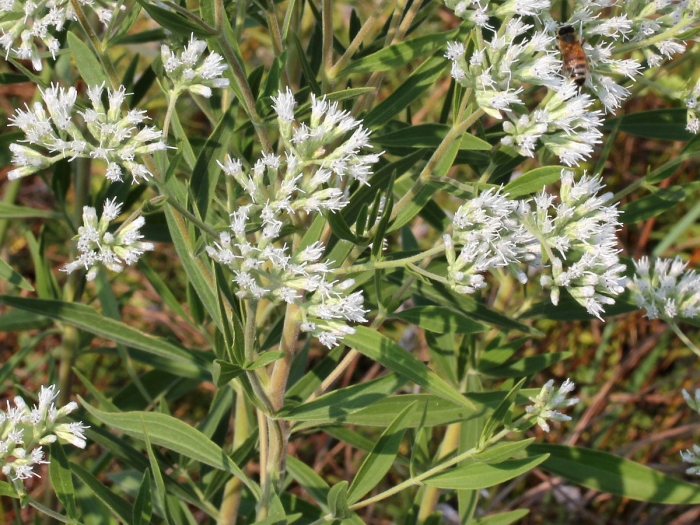Tall Thoroughwort
(Eupatorium altissimum)
Tall Thoroughwort (Eupatorium altissimum)
/
/

Peter Chen 2.0
CC BY 4.0
Image By:
Peter Chen 2.0
Recorded By:
Copyright:
CC BY 4.0
Copyright Notice:
Photo by: Peter Chen 2.0 | License Type: CC BY 4.0 | License URL: http://creativecommons.org/licenses/by/4.0/ | Rights Holder: Peter Chen 2.0 | Publisher: iNaturalist | Date Created: 2017-04-23T12:02:15-07:00 |

























Estimated Native Range
Summary
Eupatorium altissimum, commonly known as tall thoroughwort or tall boneset, is a perennial herb that is indigenous to the eastern and central United States and Canada. It is often found in open woodlands, meadows, prairies, and along roadsides, preferring calcareous (limestone-based) soils. This species can exceed 59 inches in height and is characterized by its upright form, clusters of small, fluffy white flowers that bloom from late summer to fall, and its hairy stems and leaves. The leaves are narrow, lanceolate, and sessile, with a rough texture. The flowers are not particularly showy but are known for attracting a variety of pollinators, including bees and butterflies.
Tall thoroughwort is valued for its ability to adapt to a range of soil conditions and its minimal maintenance requirements, making it a suitable choice for naturalized areas, wildflower gardens, and restoration projects. It is also recognized for its ecological role as a larval host for the three-lined flower moth. In cultivation, it prefers full sun to partial shade and can tolerate drought once established, although it thrives with regular moisture. While not commonly used in formal garden settings, it can be an interesting addition to pollinator gardens or native plant landscapes. It is generally free from serious pests and diseases but can spread aggressively in favorable conditions, potentially becoming weedy.CC BY-SA 4.0
Tall thoroughwort is valued for its ability to adapt to a range of soil conditions and its minimal maintenance requirements, making it a suitable choice for naturalized areas, wildflower gardens, and restoration projects. It is also recognized for its ecological role as a larval host for the three-lined flower moth. In cultivation, it prefers full sun to partial shade and can tolerate drought once established, although it thrives with regular moisture. While not commonly used in formal garden settings, it can be an interesting addition to pollinator gardens or native plant landscapes. It is generally free from serious pests and diseases but can spread aggressively in favorable conditions, potentially becoming weedy.CC BY-SA 4.0
Plant Description
- Plant Type: Herb
- Height: 2-6 feet
- Width: 2-3 feet
- Growth Rate: Moderate
- Flower Color: Green, White
- Flowering Season: Summer, Fall
- Leaf Retention: Deciduous
Growth Requirements
- Sun: Full Sun, Part Shade
- Water: Medium
- Drainage: Fast, Medium
Common Uses
Butterfly Garden, Low Maintenance
Natural Habitat
Open woodlands, meadows, prairies, and along roadsides, with a preference for calcareous soils
Other Names
Common Names: Tall Boneset, Tall Joepyeweed, Upland Boneset
Scientific Names: , Eupatorium altissimum, Eupatorium elatum, Eupatorium floridanum, Eupatorium floridanum, Eupatorium ramosum, Eupatorium rupestre, Eupatorium saltuense, Uncasia altissima,
GBIF Accepted Name: